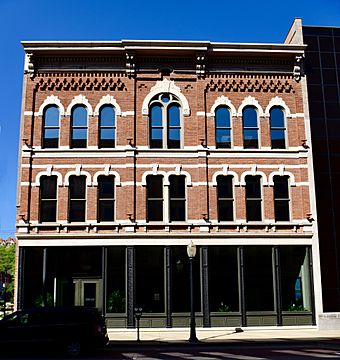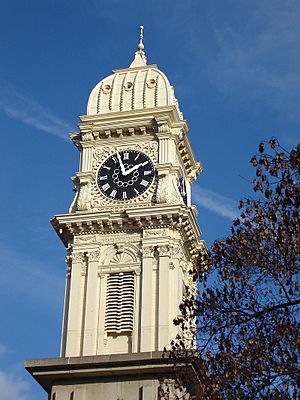Town Clock (Dubuque) facts for kids
The Town Clock is a very large clock that stands in downtown Dubuque, Iowa. This clock has been a landmark in the city for over 130 years. The clock you see today is actually the second "Town Clock." The first one sadly collapsed in the 1870s, causing a tragic accident. The building where the first clock stood is now listed on the National Register of Historic Places. However, the clock tower itself is not on that list.
Contents
History of the Town Clock
The First Town Clock
In 1864, a doctor named Asa Horr started raising money to build a town clock in Dubuque, Iowa. A company from New York City called Naylor & Co. built the clock. Its frame was designed by an architect named William Longhurst. George D. Wood allowed the city to place the clock on his John Bell and Company Store building for ten years.
This building had a long history. It was first a church, then a German theater, and later a post office and a concert hall. Finally, it became the John Bell Company store. The first clock was placed on a tower on this building. It cost about $3,000 to build. People who donated at least $25 formed a group called the Dubuque Town Clock Company. They helped take care of the clock.
On May 25, 1872, people noticed cracks in the store building's walls. Workers tried to clear the area where they thought the clock might fall. At 5:16 PM, both the clock and the John Bell store collapsed. Sadly, a child and two women inside the store lost their lives. An investigation found that the building's foundation was not strong enough for the clock's weight. Construction happening next door was also a main reason for the accident. The damage from this disaster was estimated to be between $15,000 and $20,000.
The Second Town Clock
Quick facts for kids |
|
|
Town Clock Building
|
|

The present town clock was originally located on top of this building.
|
|
| Location | 823-25 Main St. Dubuque, Iowa |
|---|---|
| Area | less than one acre |
| Built | 1873 |
| Built by | L.T. Farwell |
| Architect | Fridolin J. Heer, Sr. Edward Naescher |
| Architectural style | Italianate |
| NRHP reference No. | 01001488 |
| Added to NRHP | January 24, 2002 |
Building the New Clock
After the first clock collapsed, people in Dubuque quickly decided to build a new one. George Wood, who owned the collapsed building, wanted the new clock on his property. John Bell was not interested in being part of the new project. So, Wood decided to build the new building himself. The tower for the clock was paid for by donations from the community.
Wood cleared away the old building and a nearby house. Architects Fridolin Heer, Sr. and Edward Naescher designed the new building. They also planned a new three-story tower. A strong three-story brick building was designed to hold the tower. This tower rose about 58 feet (17.7 meters) above the building.
The city paid $5,309.46 for the new clock. It started working on April 17, 1873. The bell, which weighs over 4,200 pounds (1,905 kg), was made by Naylor & Co. A company from Boston called Howard & Co. built the clock itself. To keep time accurately, they used a special tool called a transit instrument. This tool observed stars to get very precise time readings, usually within half a second. The clock was always kept accurate within two seconds.
For many years, the clock had a mechanical movement. Two employees had to spend an hour and a half winding cranks. These cranks were attached to weights that kept the clock running for one week. In 1923, the city council almost decided to remove the Town Clock. Repairs were very expensive. However, they changed their minds after a survey showed that most citizens wanted to keep and maintain it. In 1927, the clock became electric. Interstate Power Company installed a new Seth Thomas movement. Then, Western Union helped keep the clock's time perfectly synchronized.
Moving the Clock
In the 1970s, many cities started "urban renewal" projects. A group called the "Your Town Clock Committee" was formed in Dubuque. Their goal was to move the clock from its spot at 825 Main Street to the new Town Clock Plaza. The city council approved this plan. The move cost $70,000, which was raised through donations over 14 months.
The Durrant Architecture firm in Dubuque designed a special base for the clock. This base had four columns and was made of pre-cast concrete. It was placed in the plaza. The actual clock tower was brought to the new site on February 12, 1971. It was then bolted to the new base. The clock faces were put in place on February 16, 1971. Finally, the top part of the tower, called the cupola, was added. This completed the move. After being put back together, the clock stood about 108 feet (32.9 meters) above the street. This was about two feet taller than its old location.
Moving the clock helped people see it more easily. It became the main attraction for special events held at Town Clock Plaza. Before the move, most traffic had shifted to the west side of the city. Main Street had become more of an office area. In 1989, some people worried that loud music and dancing at events might damage the clock or its base. The city studied the problem and confirmed that the Town Clock was still very strong and safe.
Recent Times
In recent years, Main Street from Fifth Street to Ninth Street was reopened to cars. It was decided that the pedestrian plaza was no longer the best option for downtown. This would have left the Town Clock in the middle of Main Street. So, a small traffic circle was built around the clock. The clock continues to be a unique and important landmark in Dubuque. Although it once froze at 7:33 due to cold weather, it has been working all year round for several years now.
 | William L. Dawson |
 | W. E. B. Du Bois |
 | Harry Belafonte |




